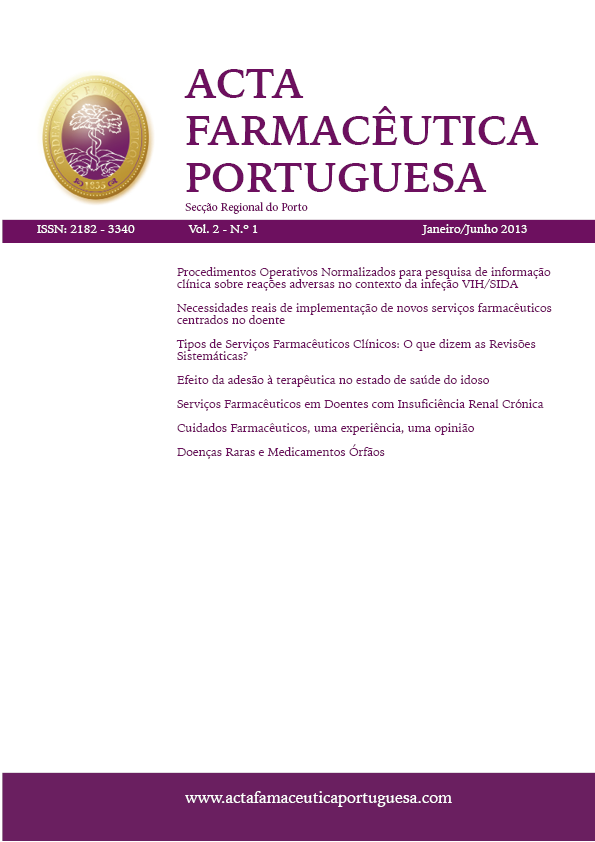Necessidades reais de implementação de novos serviços farmacêuticos centrados no doente
Abstract
While new more potent and complex pharmaceutical agents are becoming available, increasing demands on doctors and the health care system, the increase of drug related morbidity and mortality throughout the world and rising costs related with the incorrect use of medicines make it clear that the identification of a practitioner who is available to focus on the management of all of a patient’s medicines would be an important asset to the future of human health. Medicines are precious, but patients need to learn how to use them. It is possible that this will be one of the advantages that the pharmacist, as a medicine specialist, will bring to the health system, i.e. the promotion of the rational use of medicines as laid down in legislation. The correct use of medicines will significantly decrease the negative outcomes of phar- macotherapy, namely untreated health problems, ineffective treatment and unsafe treatment.
Pharmaceutical care is a patient-centered philosophy of assistential practice in which the pharmacist, as a health care team member, has responsibilities in patient medication. There are pharmaceutical services that monitor the process of the use of medicines from a preventive standpoint, identifying risk factors and acting within their constraints – dispensing, preventable morbidity indicators, medication review – and there are pharmaceutical services that monitor the outcomes from a reactive standpoint, identifying negative clinical outcomes and acting on their causes – pharmacotherapy follow-up, disease management.
The clinical pharmacist will have to develop new competencies in communication, information retrieval, critical analysis, ethical behavior, teamwork and leadership. And, more than ever, the clinical pharmacist will have to be technically competent, which requires solid training in cellular biology, biochemistry, anatomophysiology, physiopathology, pharmacology and pharmacotherapy. The assistential pharmacist will have to learn to systematize and to register its action in each type of service carried out. The main barrier that he will have to overcome will be his own mind.
This will not only provide new ways of boosting the professional satisfaction of the clinical pharmacist but will also provide concrete answers to the real situations of patients, who will ultimately receive better care.
References
Lobo Antunes J. A Nova Medicina. Lisboa: Fundação Francisco Manuel dos Santos; Janeiro 2012.
Organização Mundial de Saúde (OMS). Constituição da OMS. Nova Iorque: OMS; Julho 1946.
Alto Comissariado da Saúde e Ministério da Saúde. Evolução dos indicadores do PNS 2004-2010. Lisboa: Alto Comissariado da Saúde e Ministério da Saúde; Dezembro 2010.
Espiga de Macedo M, Lima MJ, Oliveira Silva A, Alcântara P, Ramalhinho V, Carmona J. Prevalência, Conhecimento, Tratamento e Controlo da Hipertensão em Portugal. Estudo PAP [2]. Rev Port Cardiol 2007; 26(1): 21-39.
Boavida JM, Fragoso de Almeida JP, Massano Cardoso S, Sequeira Duarte J, Duarte R, Ferreira H, Guerra F, Medina JL, Nunes JS, Pereira M, Raposo J. Diabetes: Factos e Números 2011 − Relatório Anual do Observatório Nacional da Diabetes. Lisboa: Sociedade Portuguesa de Diabetologia; Fevereiro 2012.
Teles de Araújo A (relator). Desafios e oportunidades em tempo de crise – Relatório do Observatório Nacional das Doenças Respiratórias 2011. Lisboa: Fundação Portuguesa do Pulmão e Observatório Nacional das Doenças Respiratórias; 2012.
Moore TJ, Cohen MR, Furberg CD. Serious Adverse Drug Events Reported to the Food and Drug Administration, 1998-2005. Arch Intern Med 2007; 167(16): 1752-1759.
Decreto-Lei n.o 176/2006 de 30 de Agosto. Diário da República, 1.a série, No 167: 6297-6383.
Strand LM, Martín-Calero MJ. Current Pharmaceutical Design 2004; 10: 3929-3930.
Martín-Calero MJ, Machuca M, Murillo MD, Cansino J, Gastelurrutia MA, Faus MJ. Current Pharmaceutical Design 2004; 10: 3969-3985.
FIP Pharmacy Education Taskforce. A Global Competency Framework for Services Provided by Pharmacy Workforce (draft version). London: FIP Collaborating Centre; 2010.
Fernandez-Llimos F, Faus MJ. Comment: drug-related problem classification systems. Ann Pharmacother 2004; 38(9):1542-1543.
García Delgado P, Martínez Martínez F, Gastelurrutia Garralda MA, Faus Dáder MJ. Dispensación de medicamentos. Madrid: Ergon S.A.; 2009.
Guerreiro MP, Cantrill JA, Martins AP. Morbilidade evitável relacionada com medicamentos: Validação de Indicadores para Cuidados Primários em Portugal. Acta Med Port 2007; 20(2):107-130.
Chen T, Whitehead P, Williams K, Moles R, Aslani P, Benrimoj SI. Medication review: a process guide for pharmacists. Canberra: Pharmaceutical Society of Australia; 2002.
Clyne W, Blenkinsopp A, Seal R. A Guide to Medication Review 2008. London: NPC; 2008.
Comité de Consenso GIAF-UGR, GIFAF-USE, GIF-UGR. Tercer Consenso de Granada sobre Problemas Relacionados con Medicamentos (PRM) y Resultados Negativos asociados a la Me- dicacion (RNM). Ars Pharm 2007; 48(1): 5-17.
Bluml BM. Definition of Medication Therapy Management: Developement of Professionwide Consensus. J Am Pharm Assoc 2005; 45: 566-572.
Armour C, Bosnic-Anticevich S, Brillant M, Bur- ton D, Emmerton L, Krass I, Saini B, Smith L, Stewart K. Pharmacy Asthma Care Program (PACP) improves outcomes for patients in the community. Thorax 2007; 62(6):496-502.
Chisholm-Burns MA, Lee JK, Spivey CA, Slack M, Herrier RN, Hall-Lipsy E, Zivin JG, Abraham I, Palmer J, Martin JR, Kramer SS, Wunz T. US Pharmacists’ Effect as Team Members on Patient Care. Systematic Review and Meta-Analyses. Medical Care 2010; 48(10): 923-933.
Decreto-Lei n.o 288/2001 de 10 de Novembro. Diário da República, 1.a série, No 261.
Ley 29/2006 de 26 de julio. BOE-A-2006-13554. BOE, No 178: 28122-28165.
Berenguer B, La Casa C, de la Matta MJ, Martín-Calero MJ. Pharmaceutical Care: Past, Present and Future. Current Pharmaceutical Design 2004; 10: 3931-3946.


